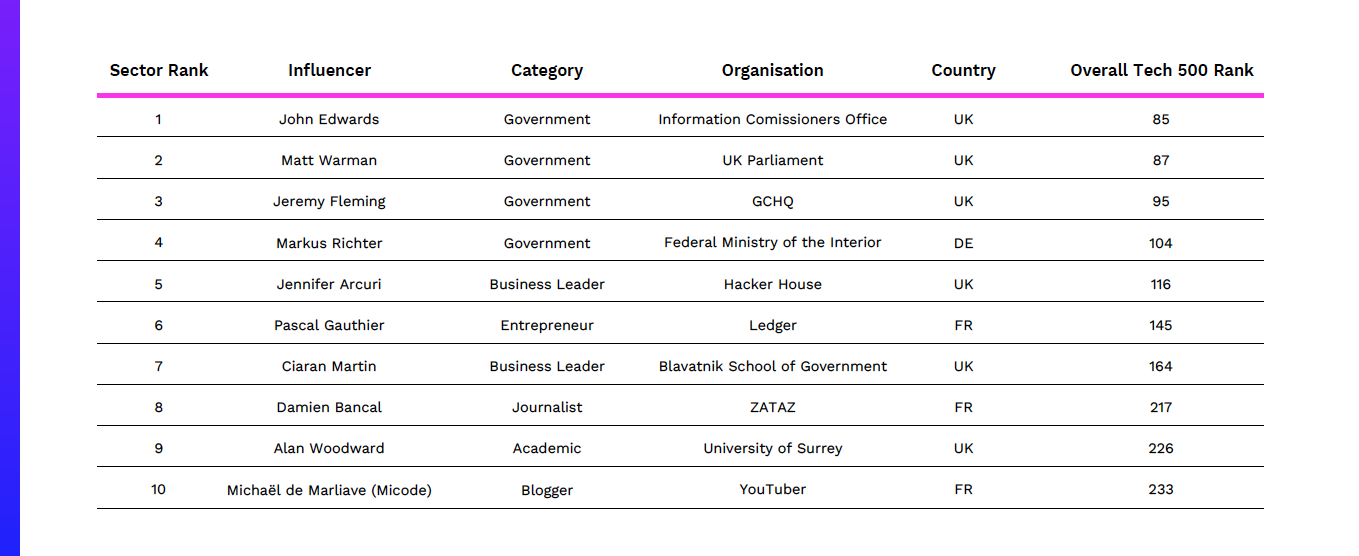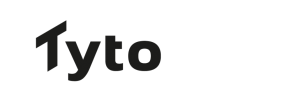The evolving European cybersecurity landscape: What the Tyto Tech 500 report tells us
The role of cybersecurity in the modern world is no longer just a topic for IT departments – it’s a concern that resonates at the level of individual households, multinational corporations, and even governments. In the following article, I want to delve into the rapid transformations happening in the European cybersecurity landscape, fueled by findings from our latest Tyto Tech 500 report. The report uncovers some compelling insights, shedding light on the growing prominence of cybersecurity influencers, the sectors that are gaining and losing traction, and the impact of current global events on cybersecurity relevance.
The growing importance of cybersecurity
There is a seismic shift in how both the general public and experts view cybersecurity. Instances of cyberattacks are becoming increasingly frequent and sophisticated, while global trends like IoT, remote work, and BYOD are expanding the potential attack surface. These shifts are not happening in isolation, they are influenced by a broader backdrop of geopolitical tensions and a pandemic-induced new normal.
Key insights from the Tyto Tech 500
- Cybersecurity shows prominent growth
According to our Tyto Tech 500 report, the Cybersecurity category witnessed the largest absolute growth of all tech sectors analysed, with the number of influencers going from 52 to 79 — a shocking increase of 52%. While Quantum Technology led in percentage increase (a whopping +114% rise), Cybersecurity followed closely behind, confirming that the field is now more significant than ever. This growth is fueled by an ongoing climate of insecurity and uncertainty, exacerbated by geopolitical events like the war in Ukraine.
- Global and regional trends
Our report also provides a fascinating regional breakdown of cybersecurity’s rising influence. In the UK, the number of influential figures in the field went from 16 to 36. Germany saw a rise from 19 to 22, and France, starting from zero influencers in 2020, skyrocketed to 21 this past year. These statistics reveal a pan-European focus on the subject, signaling the international weight that cybersecurity now carries.
- A different pan-European picture
Interestingly, Cybersecurity and HealthTech both showed the largest absolute increase in the number of influencers, but the story is different when focusing solely on the top 500 pan-European influencers. In this more elite group, Cybersecurity saw a moderate increase of just 4%, suggesting perhaps that while the field is growing, the top influencers in this area remain consistent.
- Who’s who in cybersecurity and what do they have to tell?
Here’s the top 10 breakdown of influencers in the Cybersecurity space. There are key influencers in the European digital government sector such as John Edwards, the UK’s Information Commissioner; Matt Warman, Minister of State at the Department for Digital, Culture, Media and Sport in the UK; and Markus Richter, State Secretary at the Federal Ministry of the Interior, Building and Community in Germany. The ranking also includes relevant business and media figures.

Top 10 personalities in the Tyto Tech 500 Cybersecurity space
“Cyber attacks are a global concern and businesses around the world need to take steps to guard against complacency” – John Edwards, Information Commissioner, UK
In an article for UK outlet the Independent, John Edwards stated that the biggest cyber risk businesses face is from complacency, not hackers. He said many businesses were still not taking cybersecurity seriously enough. For example, the Interserve Group received a fine of £4.4 million for failing to keep the personal information of staff secure, which was treated as a breach of the data protection law. The ICO found that the company had failed to put appropriate security measures in place to prevent a cyber attack, which enabled hackers to access the personal data of up to 113,000 employees through a phishing email. Edwards warns companies to expect a similar fine from his office if they are found to have failed to put protections in place. We are curious to see if this warning will have an impact on reducing future breaches in the UK.
To complement the statement from Edwards, Dr. Markus Richter, Federal Government Commissioner for Information Technology – the so-called CIO of the Federal Government in Germany, adds in an interview that the BSI (Federal Office for Information Security) launched an “Alliance for Cyber Security” back in 2012, which many companies have already joined. The aim of the alliance is to enable those involved to talk openly about their experiences and knowledge in dealing with cybercrime. Such formats are indispensable, especially in the event of an emergency. Richter hopes to encourage more companies to join and network, whether through them or among themselves.
Anticipating tomorrow: The evolution of cybersecurity
The Tyto Tech 500 report makes it clear that the climate of insecurity — be it related to geopolitical tensions or increasing cyber attacks on private institutions and governments — has made cybersecurity a household term. The field isn’t just growing in terms of experts or influencers; it’s becoming part of a global dialogue about safety, privacy, and international relations.
Given the rapid technological advancements, it’s likely that the cybersecurity landscape will continue to evolve. Areas like AI-based threat detection, zero-trust architecture, and even quantum encryption are the frontiers to watch. The field is attracting substantial investment and talent, as confirmed by its rising influence in reports like the Tyto Tech 500.
The Tyto Tech 500 corroborates what many in the tech industry have long suspected: cybersecurity is not a fringe topic but a core concern that intersects with various aspects of society and governance. The surge in influencers in this field is not just a statistic; it’s an indicator of a paradigm shift in how we perceive digital security. As this field intersects with other rapidly evolving technologies like Quantum Technology and SpaceTech, a multi-disciplinary approach may become more crucial in addressing complex cybersecurity challenges. And as cyber threats continue to evolve, so too will our approaches to countering them. Now more than ever, staying updated and engaged in the field of cybersecurity is not just advisable — it’s essential.
Keep your eyes peeled: the new Tyto Tech 500 for 2023 is coming soon!











